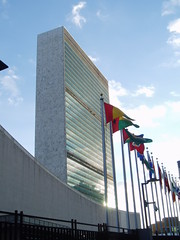
At UN, Obama Calls for Global Transparency but Offers Few Details
9/28/2010
 On Sept. 23, President Barack Obama addressed the United Nations (UN), calling on countries to strengthen government openness. He emphasized the importance of transparency in fighting corruption and increasing civic engagement. At a world summit the day before, Obama trumpeted his administration's new global development policy, which pledges more transparency related to U.S. aid activities. However, the administration refused to release the text of the policy, and details remain sparse.
On Sept. 23, President Barack Obama addressed the United Nations (UN), calling on countries to strengthen government openness. He emphasized the importance of transparency in fighting corruption and increasing civic engagement. At a world summit the day before, Obama trumpeted his administration's new global development policy, which pledges more transparency related to U.S. aid activities. However, the administration refused to release the text of the policy, and details remain sparse.
In his speech to the UN General Assembly, Obama praised the benefits of transparency. He noted that the foundation of liberty and human progress “lies in open economies, open societies, and open governments.” He went on to say that “America is working to shape a world that fosters this openness,” and added, “The common thread of progress is the principle that government is accountable to its citizens.”
Obama argued that one key element in creating accountability is “to make government more open and accountable.” He challenged the United Nations members to return in 2011 with “specific commitments to promote transparency; to fight corruption; to energize civic engagement; to leverage new technologies so that we strengthen the foundations of freedom in our own countries, while living up to the ideals that can light the world.”
Echoing the speech, the White House released a fact sheet on recent developments in transparency in the U.S. and abroad, which reiterated Obama’s call for countries to return to the UN in 2011 with specific transparency commitments.
The day before the UN speech, Obama addressed a world summit to review progress toward the Millennium Development Goals (MDGs). Adopted by UN members in 2000, the MDGs set global development targets for the year 2015 on topics such as poverty, health, and environmental sustainability.
In his remarks, the president made clear that transparency would be a prominent element of U.S. development policy, saying the U.S. would focus its development efforts on countries with good governance and transparent institutions. The president also urged other donor countries to "commit to the same transparency that we expect from others."
Before the summit, OMB Watch sent a letter to the president asking him to publicly address transparency at the summit. The letter also detailed several needed reforms to improve U.S. aid transparency.
New Global Development Policy
The White House also used the summit as an opportunity to announce its new Presidential Policy Directive on Global Development. A fact sheet on the policy outlined the three areas of focus for development. First, the administration will seek to maximize the return on development investments by focusing on projects with the most sustainable outcomes. Second, the government will pursue a new model of engagement that will enable the U.S. to be a better partner in development projects. Third, development will be elevated within the government to the equal of diplomacy and defense. The fact sheet stated that the U.S. would expect transparency from recipients of U.S. aid and pledged "greater transparency" for U.S. aid activities.
In separate fact sheets, the Millennium Challenge Corporation emphasized transparency in its activities and the Treasury Department emphasized transparency in multilateral development banks to which the U.S. contributes, while the Global Climate Change Initiative mentions improving transparency in recipient countries.
The White House heralded the Presidential Policy Directive on Global Development as the first such policy by a U.S. administration but refused to release the text of the actual policy directive. Apparently, the policy is a classified document of the National Security Council. The fact sheet does repeatedly discuss the importance of development within the national security strategy.
The classification process requires documents to meet strict standards of including information that would be damaging to national security if released before the record can be classified. The administration has not articulated publicly how its development policy meets these requirements. (At the end of the Bush administration, a Senate hearing examined the problems of secret policies.)
Gregory Adams of development charity Oxfam America criticized the decision, noting, "The Administration should make sure that enough [information] gets out to not only provide the American people with a clear rationale for the new approach, but also make sure that our partners around the world understand how we plan to change the way we work with them."
Results of the MDGs Summit
The summit's outcome document noted the benefits of transparency and accountability in both donor and developing countries, as well as in UN agencies, to achieving the MDGs. The document emphasized that providing more data on aid spending and its results can mobilize greater support for donors to fulfill their commitments. The document also emphasized the role of transparency in ensuring that aid spending reaches its intended beneficiaries:
To build on progress achieved in ensuring that [development aid] is used effectively, we stress the importance of democratic governance, improved transparency and accountability, and managing for results.
However, the document was criticized by the international human rights group Article 19, which called the transparency language "strong on rhetoric but weak on commitment" and said the transparency elements were "only minimal pledges."
Image in teaser by flickr user stevecadman, used under a Creative Commons license.


